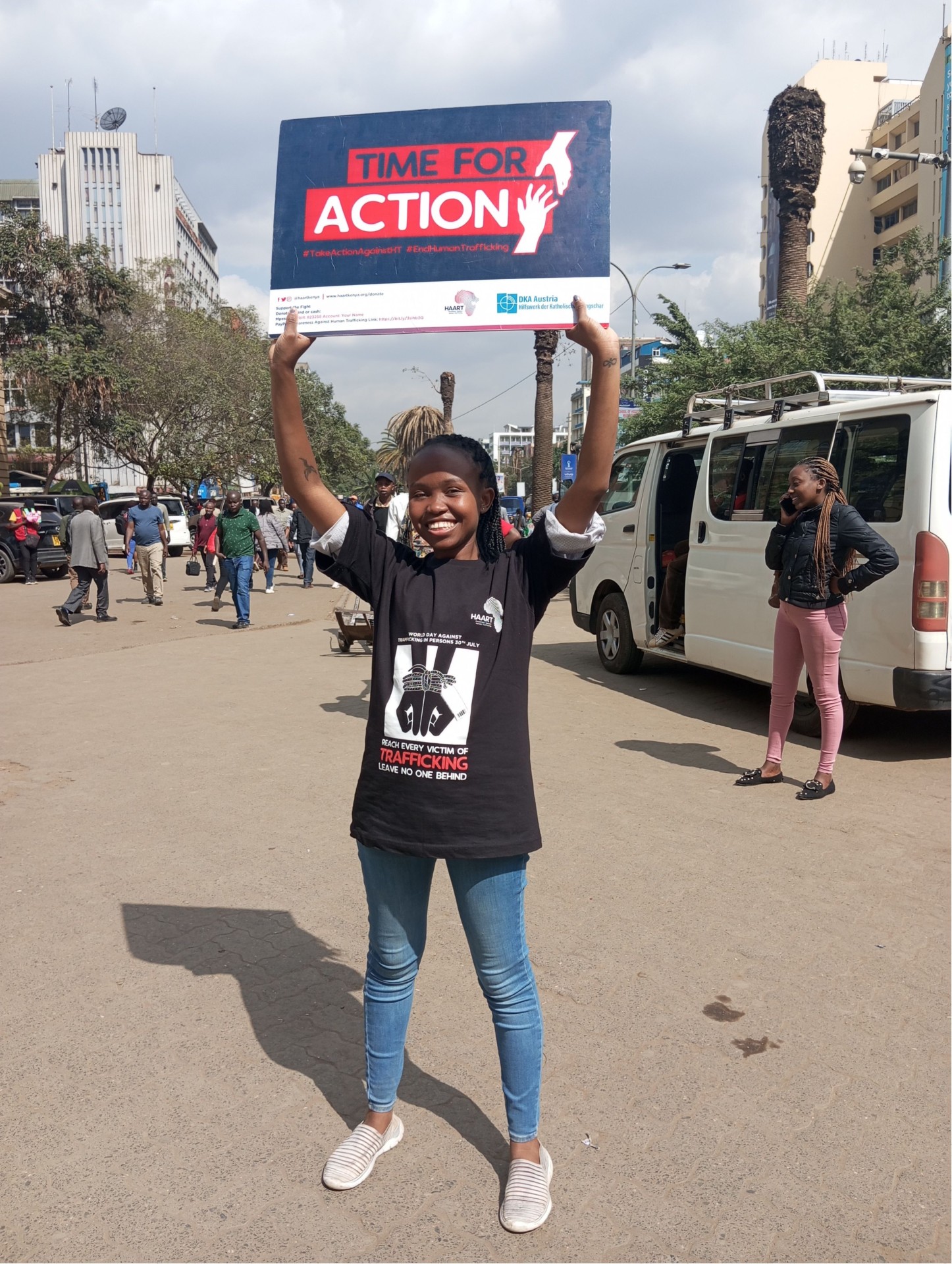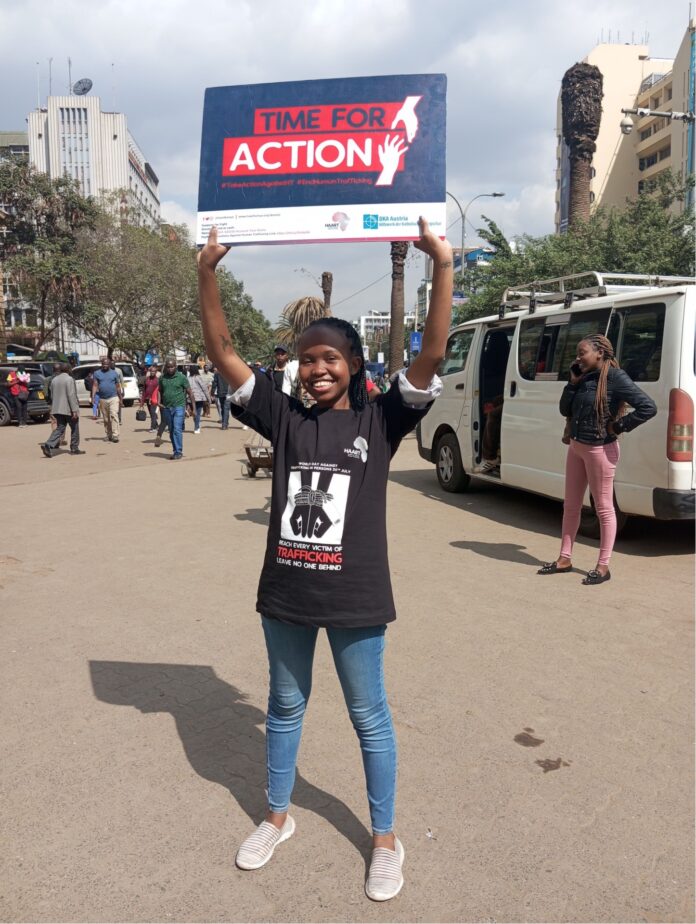By Lenah Bosibori
Nairobi, Kenya: Mary Muroki left Kenya in the year 2000 and went to look for greener pastures in Jordan, little did she know it was slavery.
Muroki was connected through a friend. “I met a friend who told me that life was better out there,” said Muroki during an interview in Nairobi.
According to Muroki, when she reached Jordan she was locked in a house for five years without getting outside the compound.
“When they later realized that I could not move from their house, they started giving me dogs to take out for a walk outside the compound,” adds Muroki.
According to data by HAART Kenya, 85 percent of human trafficking survivors are women, most of them hail from Kakamega and the Coast regions.

She adds that during her rounds outside the compound, she met someone who later rescued her.
“I met a man who was very concerned about my health and the way I was taking care of big dogs, he asked me where I worked and I told him, he later told me to return the dogs inside and follow him. I was very scared since he was a man and I didn’t know where he was taking me, I later realized he was a man of God who owned his own church,” added Muroki.
Muroki said that she did something very stupid but later realized that it was not stupid as she was saved from her abusers.
According to Muroki, staying with her second family who rescued her was also hectic because she didn’t have her documents.
“Since I had run away, I never had any documents to enable me to do any kind of jobs,” added Muroki.
“The only good thing was that these people from the church were good, they took me to hospital and gave me food for all the five years I stayed with them,”added Muroki.
After staying with them for five years, they connected me to another good Samaritan who took me to Syria bordering Jordan.
“Syria is a very bad country, the good thing was that I never interfered with alcohol, I got another church member who supported me until the Kenyan government and Jordan signed the contract to allow other people from Kenya to go and work in Jordan, ” said Muroki.
Muroki adds that after the two countries signed a contract she got her work permit and freedom to work anywhere without fear.
“I later realized that all Kenyans who were working there were mistreated, some were even sleeping on the streets,” adds Muroki.
She started supporting them by hiding them in her room which later became smaller because the numbers kept increasing.
“Later I couldn’t hide them any longer as I feared the landlord, I didn’t want the landlord to know that I was hiding people in my room,” adds Muroki.
Muroki adds that she Later went to the Kenyan consulate and asked them to help her get a place for the people she was hiding to get accommodation.
“Those people at the consulate were good, they gave me the number of the ambassador and I wrote a letter to him,” adds Muroki.
The ambassador later came and saw the Kenyans she was hiding. “He was so happy, he went to the Ministry of Labour and had a meeting with the association and later rented a house for them,” adds Muroki.
Muroki was freed to continue supporting them with food as she was already working. She went ahead to support even the ones who were in prison.
“In total 90 people were released and came back home. I also met another organization which helped me in paying for their tickets back home,” adds Muroki
“When I finished rescuing Kenyans I started following up on Ugandans and Ghanaians, when everything was over the government paid for my ticket and I came back home in 2021,” adds Muroki.
In Kenya, Muroki joined HAART Kenya, a non-governmental organization based in Nairobi dedicated to fighting human trafficking in East Africa.
Speaking during World Day against trafficking in persons, the Cabinet Secretary for labor and social protection Florence Bore said that trafficking in persons is a global crisis that affects nearly every country in the world and anyone can be a victim.
“Human trafficking has a devastating impact on victims, we are going to say no to trafficking of persons,” said Bore.
She added that the government is in its final stages to provide shelter houses for traffic-kicked people who have returned back.
“The shelter houses should be able to start soon, we have space and we will be able to rehabilitate the one that is there as we look for money to build many more,” reiterates Bore.
“We will also create jobs for them and give them money to start a business, added Bore.
Bore added that the government has vetted all the recruitment agencies and reduced them to 500.
“We have vetted this recruitment agencies from 900 to 500 this shows you that we had many rogue agencies,” said Bore.
“We have Kenyans who have gone to school and are very good, we want to ensure that when they get jobs out there they are well treated and paid well,” said Bore.
Giovanni Broussard, a representative of the United Nations Office for Drugs and Crime (UNODC) said in his remarks Human trafficking is a multi-billion dollar criminal enterprise that must stop.
“Many Kenyans, Tanzanians and Ethiopians travel to the gulf and Asian regions seeking for better opportunities, only to find themselves in situations of vulnerabilities and finally end up being exploited and trafficked,” said Broussard.
He added that raising awareness of this crime is insufficient, combating it requires multidisciplinary and cross-border efforts to tact, investigate and prosecute the crime
Winnie Akinyi works at HAART Kenya as the Outreach Care Manager and here is what she had to say.
“We work with survivors across the country and East Africa, we give them food, shelter, clothing, and education both primary and secondary,” adds Akinyi.
She adds that they pay for Tertiary education for those who wish to improve their skills.
“We have worked with 1200 survivors and the number keeps on growing, we are supporting over 1000 in different programs,” adds Akinyi.
According to her, the survivors get referrals from people who have seen their relatives getting mistreated while in the gulf
Akinyi calls upon all citizens willing to travel to ensure their families and government know about their travel.
“Do not travel secretly, go safely, make sure the government and your families know you are traveling, and make sure you have the adequate information and legit documents to protect yourself,” adds Akinyi.














